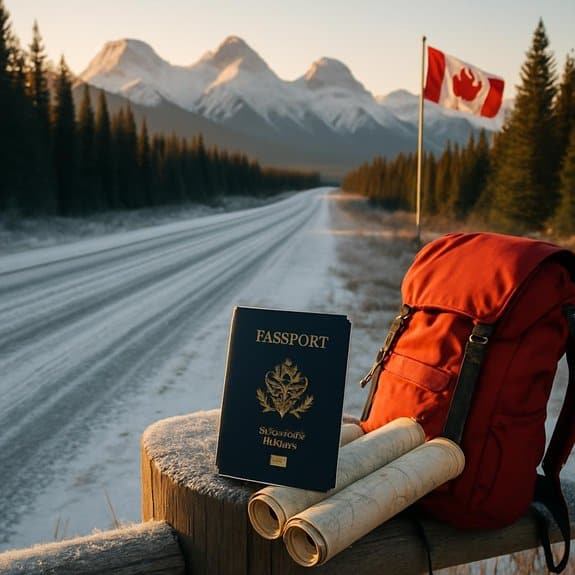
Your best pathways to Canada include CUSMA work permits for 63 high-skill professions, spousal sponsorship if you have a Canadian partner, the Express Entry system for skilled workers, or the Start-Up Visa for entrepreneurs. Young Americans can explore the International Experience Canada program, while students can pursue study permits leading to post-graduation work permits. Each pathway has specific requirements and processing times that determine which option suits your situation.
CUSMA Work Permits for U.S. Citizens in High-Skill Professions
Ever wondered how you could leverage your professional skills to work in Canada without the typical immigration hurdles?
The Canada-United States-Mexico Agreement (CUSMA) offers U.S. citizens in 63 high-skill professions a streamlined path to Canadian employment. If you’re an engineer, accountant, IT professional, or work in other eligible occupations, you can bypass the Labour Market Impact Assessment requirement that typically complicates foreign hiring.
CUSMA eliminates typical work permit barriers for 63 high-skill professions including engineers, accountants, and IT professionals
You’ll need three key elements: U.S. citizenship, a job offer from a Canadian employer in your qualified profession, and proof of your credentials.
Applications can often be processed directly at the Canadian border or online, with work permits valid for up to three years and renewable indefinitely. There’s no annual cap limiting applications, making this one of the most accessible pathways for qualified American professionals.
Study Permits and Post-Graduation Work Permits for American Students
While CUSMA work permits offer immediate employment opportunities, pursuing education in Canada provides another strategic pathway that can lead to both professional development and permanent residency.
As an American, you’re considered an international student and need a study permit for programs longer than six months. During your studies, you can work part-time, gaining valuable Canadian experience.
After graduation, you’ll qualify for a Post-Graduation Work Permit (PGWP), allowing you to work for any employer for up to three years, depending on your program’s length.
This Canadian education and work experience greatly improves your Express Entry profile, boosting your chances for permanent residency.
Top institutions like University of Toronto, McGill, and UBC welcome American students, making this pathway particularly attractive for those seeking long-term settlement in Canada.
International Experience Canada Working Holiday Visa for Young Americans
If you’re between 18 and 35, the International Experience Canada (IEC) program offers an exciting opportunity to explore Canada while working for up to 12 months.
This working holiday visa lets you work for any employer anywhere in Canada without restrictions. You’ll need to apply through Recognized Organizations due to limited spots available for Americans.
The program requires U.S. citizenship or permanent residency, proof of $2,500 CAD in funds, health insurance, and a clean criminal record. You can’t bring dependents on this visa.
U.S. citizens need $2,500 CAD, health insurance, and clean criminal records to qualify.
Beyond the working holiday stream, IEC also offers Young Professionals and International Co-op options if you have specific job offers. This temporary work experience helps you build Canadian connections and explore whether permanent immigration suits your goals.
Spousal Sponsorship for Americans With Canadian Partners
When you’re married to or in a common-law relationship with a Canadian citizen or permanent resident, you’ve got one of the most straightforward paths to Canadian permanent residency available.
Your Canadian partner can sponsor you without points systems, job offers, or quotas—the process focuses solely on proving your relationship’s genuineness.
You’ll need to demonstrate you’re legally married or have lived together for at least one year as common-law partners.
The sponsor must be 18 or older and meet basic financial requirements.
If you’re already in Canada with a valid status, you can apply inland and receive an open work permit during processing.
Outland applications work if you’re in the U.S.
Processing takes about 12 months, after which you’ll become a permanent resident with full rights to live and work anywhere in Canada.
Claiming Canadian Citizenship by Descent Through a Parent
Many Americans don’t realize they’re already Canadian citizens through their parents’ citizenship status. If you were born outside Canada to a Canadian parent, you’re likely a Canadian citizen by law. This applies when your parent was Canadian by birth or naturalization, not by descent.
Millions of Americans unknowingly hold Canadian citizenship through their parents’ status.
The first-generation limit means that second-generation immigrants born abroad typically aren’t eligible.
You’ll need to apply for a citizenship certificate to confirm your status. Required documents include your birth certificate, your parents’ proof of Canadian citizenship, and evidence of your relationship.
Processing takes four to eight months. Since you’re already legally Canadian, there’s no immigration process needed. Both countries allow dual citizenship, so you won’t lose your American status.
This pathway provides immediate rights to live and work in Canada without permits or restrictions.
Express Entry System for Skilled American Workers
While having a Canadian parent or spouse offers the fastest route to Canada, skilled American workers can successfully immigrate through the Express Entry system. This points-based program evaluates your education, language skills, work experience, and age to determine eligibility for permanent residence.
You’ll need to create an online profile and receive a Thorough Ranking System (CRS) score. Higher scores come from advanced degrees, professional certifications, French language abilities, and Canadian work experience.
The government conducts regular draws, typically every two weeks, inviting top-scoring candidates to apply. Processing takes about six to eight months after receiving an invitation.
As an American, you’re eligible for all three Express Entry programs: Federal Skilled Worker, Canadian Experience Class, and Federal Skilled Trades. Many Americans boost their scores through Provincial Nominee Programs, which add 600 points to their profile.
Provincial Nominee Programs Tailored to Regional Needs
Provincial Nominee Programs (PNPs) offer a strategic alternative to Express Entry, especially if you’re targeting a specific Canadian province or territory. Each province operates its own program with unique criteria tailored to local economic needs and labour shortages.
You’ll find PNPs particularly advantageous if you have skills matching regional demands or existing connections to a province.
Key advantages of PNPs include:
- Lower language and education requirements than Express Entry
- Direct pathways for specific occupations in high demand
- An additional 600 points added to your Express Entry profile if nominated
- Opportunities in smaller communities with lower competition
- Faster processing times for certain in-demand professions
Popular programs include Ontario’s Human Capital Priorities, British Columbia’s Tech Pilot, and Alberta’s Accelerated Tech Pathway, each designed to attract professionals addressing provincial workforce gaps.
Start-Up Visa Program for American Entrepreneurs
Four key criteria define success in Canada’s Start-Up Visa Program, making it an attractive pathway for American entrepreneurs ready to scale their innovative businesses north of the border.
You’ll need a qualifying business supported by a designated Canadian organization, whether that’s an angel investor group, venture capital fund, or business incubator. Your business must be incorporated in Canada, with you holding at least 10% voting rights.
The designated organization must commit to supporting your venture through a letter of support. Unlike traditional work permits, you don’t need an existing job offer or LMIA.
Processing typically takes 12-18 months, during which you can apply for a work permit to begin operations. This program offers permanent residence immediately upon approval, letting you build your business while establishing roots in Canada.
Family Sponsorship Beyond Spouses for Close Relatives
Although spousal sponsorship remains the most common family reunification pathway, Canada’s immigration system extends sponsorship opportunities to other close family members under specific circumstances.
You can sponsor relatives if you’re a Canadian citizen or permanent resident meeting financial requirements.
Eligible family members include:
- Dependent children under 22 years old
- Parents and grandparents through the Parent and Grandparent Program
- Orphaned siblings, nieces, nephews, or grandchildren under 18
- One relative of any age if you have no other family in Canada
- Adopted children meeting specific international adoption requirements
The Parent and Grandparent Program operates through an annual lottery system with limited spots.
Processing times vary greatly—dependent children take about 12 months, while parent sponsorship can extend beyond 24 months.
Understanding Refugee and Asylum Options for U.S. Citizens
While most Americans seeking to move to Canada pursue traditional immigration pathways, understanding refugee and asylum options remains important for those facing genuine persecution in the United States.
You must meet strict criteria: demonstrating fear of persecution based on race, religion, nationality, political opinion, or membership in a particular social group. The persecution must come from state actors or groups that the government can’t control.
You’ll need to prove there’s no safe relocation option within the U.S. and that you face serious future risk, not just past harm. The Safe Third Country Agreement complicates claims made at the border, though exceptions exist.
LGBTQ+ individuals, whistleblowers, and others facing systematic persecution may have stronger cases. Consider confidential legal consultation before pursuing this complex pathway.
How Canadian Currents Immigration Services Can Help
Maneuvering Canada’s complex immigration system requires expert guidance to identify your strongest pathway and avoid costly mistakes.
Canadian Currents Immigration Services combines decades of collective experience from lawyers, consultants, and paralegals who understand the intricacies of immigration law.
You’ll receive a personalized assessment to determine your best options:
- Eligibility evaluation for multiple programs simultaneously
- Document preparation ensuring completeness and accuracy
- Strategic planning to maximize approval chances
- Timeline optimization for faster processing
- Cost-effective solutions tailored to your budget
Whether you’re pursuing Express Entry, family sponsorship, work permits, or citizenship claims, their team crafts strategies specific to your circumstances.
They’ll navigate regulatory changes, handle government correspondence, and provide representation throughout your application process, transforming an overwhelming journey into a manageable path toward your Canadian future.
Conclusion
You’ve explored multiple pathways to make Canada your new home. Whether you’re leveraging CUSMA work permits, pursuing education, or utilizing family connections, each route offers unique advantages. Consider your professional qualifications, personal circumstances, and long-term goals when selecting your immigration strategy. Start gathering required documents early and guarantee you meet specific program requirements. With careful planning and the right pathway, you’ll successfully shift from American citizen to Canadian resident or citizen.

We serve ALL of Canada. Currently have offices Western Canada — Vancouver, Calgary, Edmonton, Kamloops and Red Deer. We also have the infrastructure to work with any of our clients virtually — even from the furthest regions of the Yukon to Newfoundland.
Call (778) 331-1164 [toll free 1 (844) 715-0940] to get routed to the best office for you or contact us online to schedule an appointment.
We also have a dedicated intake form to help you get the ball rolling. Our intake team will review your specific case and advise you on the next steps to take as well as what to expect moving forward.
Our offices are generally open 8:30 a.m.—4:30 p.m., Mon—Fri.


Dylan Robertson
IMMIGRATION LAWYER
Dylan assists clients with a wide range of immigration law matters including refugee applications and appeals, removal order appeals, and sponsorship appeals. Dylan understands the needs of his clients and is dedicated to providing them with the clear and effective advocacy they require to navigate the Canadian immigration system.


